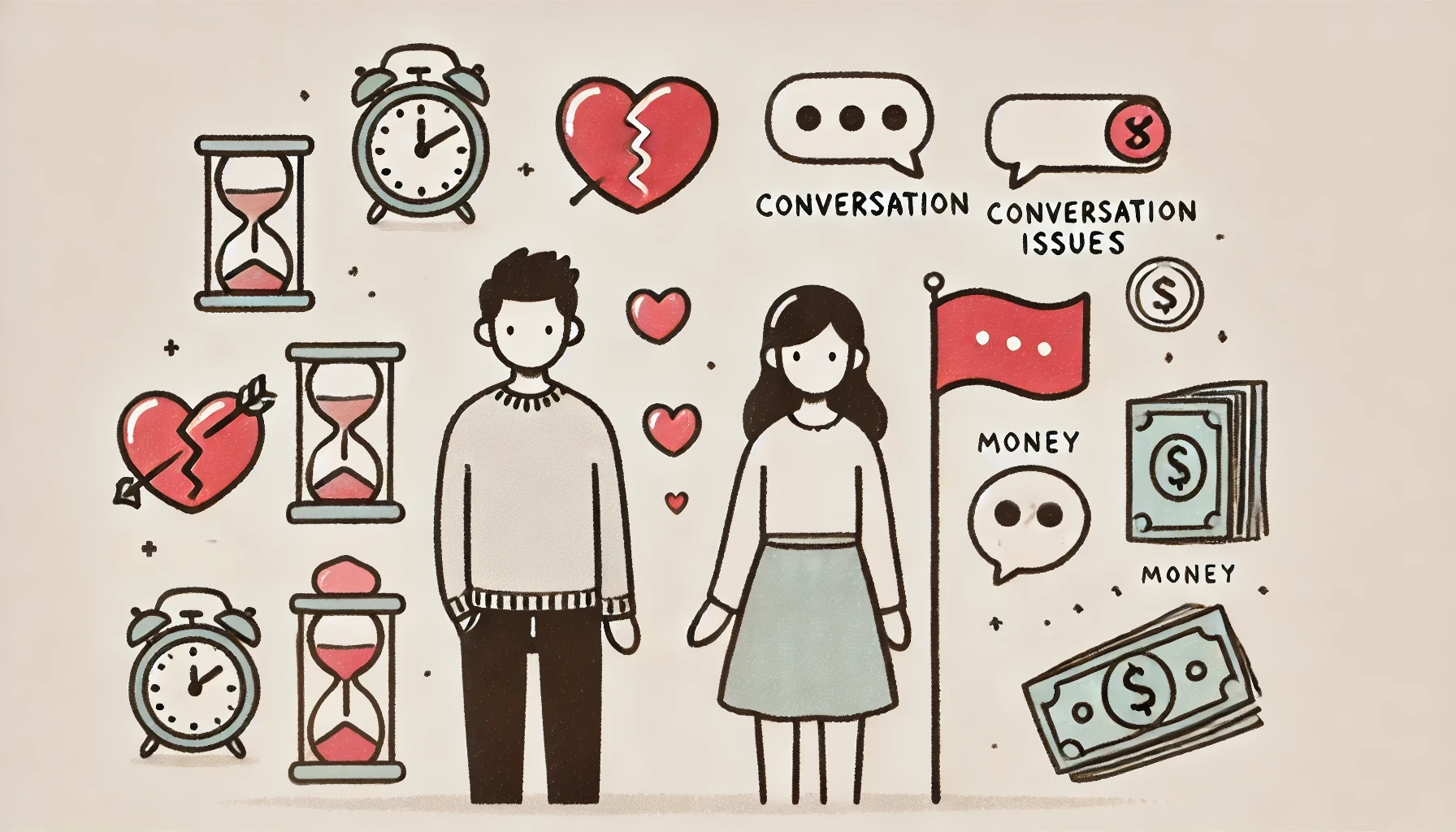Relationship Etiquette refers to the set of unwritten rules and behaviors that couples should follow to maintain a respectful, loving, and healthy relationship. These guidelines help partners navigate their interactions, ensuring mutual respect, understanding, and appreciation.
Understanding relationship etiquette is crucial for new couples or individuals new to dating because it lays the foundation for a strong, enduring bond.
For new couples, comprehending relationship etiquette can prevent misunderstandings and foster a positive environment where both partners feel valued and understood. It teaches individuals the importance of communication, respect, and small acts of kindness that can significantly enhance the relationship’s quality.
In this blog post we will discuss some basic relationship etiquette everyone starting a relationship should know and practice.
Basic Relationship Rules
Building and maintaining a healthy relationship requires understanding and practicing essential relationship etiquette. These basic rules serve as a foundation for a strong and fulfilling partnership. By adhering to these principles, couples can navigate their relationship with respect, appreciation, and effective communication.
Learn Something New About Your Partner Daily
Continuous discovery and understanding are vital for keeping the relationship dynamic and deeply connected. Learning something new about your partner every day helps in fostering intimacy and preventing stagnation.
Importance of Continuous Discovery:
- Promotes deeper emotional connections.
- Helps in understanding each other’s evolving needs and desires.
- Keeps the relationship interesting and engaging.
Tips for Daily Integration:
- Ask Open-Ended Questions: Encourage conversations that go beyond routine topics. Ask about their dreams, aspirations, and feelings.
- Share Experiences: Try new activities together and discuss your experiences and thoughts.
- Daily Check-Ins: Spend a few minutes each day catching up about each other’s day, thoughts, and feelings.
- Listen Actively: Show genuine interest and attention when your partner shares something new.
Open and Honest Communication
Clear and open communication is the backbone of any successful relationship. It ensures that both partners feel heard, understood, and valued.
Importance of Communication:
- Prevents misunderstandings and conflicts.
- Builds trust and transparency.
- Facilitates problem-solving and decision-making.
Tips for Effective Communication:
- Be Clear and Direct: Express your thoughts and feelings honestly without ambiguity.
- Practice Active Listening: Pay full attention, acknowledge what your partner says, and respond thoughtfully.
- Use “I” Statements: Focus on expressing your feelings rather than blaming. For example, say “I feel hurt when…” instead of “You always…”
- Schedule Regular Talks: Set aside time for meaningful conversations to discuss your relationship, goals, and any issues.
CHECK: Girlfriend Wets The Bed: What To Do?
Mutual Respect
Respecting each other’s opinions, boundaries, and individuality is crucial for a healthy relationship. Mutual respect fosters a supportive and harmonious environment.
Necessity of Respect:
- Ensures both partners feel valued and understood.
- Prevents resentment and conflicts.
- Encourages personal growth and independence.
Examples of Showing Respect:
- Acknowledge Boundaries: Respect your partner’s personal space and limits.
- Value Opinions: Even if you disagree, appreciate and consider your partner’s perspective.
- Support Goals: Encourage your partner’s ambitions and hobbies.
- Avoid Criticism: Focus on constructive feedback rather than negative criticism.
Acknowledge and Appreciate Each Other
Regular acknowledgment and appreciation strengthen the bond between partners and enhance relationship satisfaction.
Role of Appreciation:
- Reinforces positive behavior and mutual support.
- Boosts self-esteem and happiness.
- Fosters a loving and positive atmosphere.
Ways to Show Appreciation:
- Express Gratitude: Regularly thank your partner for their efforts and kindness.
- Give Compliments: Sincerely praise your partner for their qualities and achievements.
- Small Gestures: Show your appreciation through small acts of kindness, like leaving a note or planning a surprise.
- Celebrate Milestones: Acknowledge and celebrate special occasions and achievements together.
Manage Differences Constructively
Handling conflicts and disagreements positively is essential for a resilient relationship. Constructive management of differences ensures long-term harmony and growth.
Strategies for Positive Conflict Resolution:
- Stay Calm: Approach disagreements with a calm and open mind.
- Focus on Solutions: Instead of dwelling on problems, work together to find solutions.
- Compromise: Be willing to meet halfway and make sacrifices for the greater good of the relationship.
- Seek to Understand: Try to understand your partner’s viewpoint and feelings before responding.
By adhering to these basic relationship rules, couples can cultivate a loving, respectful, and enduring partnership. Practicing relationship etiquette daily helps in building a strong foundation for a happy and fulfilling relationship.
Gentlemanly Gestures
In any relationship, small acts of kindness and respect can make a significant difference. Gentlemanly gestures are timeless practices that demonstrate care and thoughtfulness towards your partner.
These gestures not only reflect good manners but also strengthen the bond between partners, making the relationship more enjoyable and fulfilling.
The Sidewalk Rule
The sidewalk rule is a classic example of traditional chivalry where a man walks on the side of the sidewalk closest to the street, while his partner walks on the inner side.
This gesture originated in times when streets were filled with hazards such as mud, debris, and horse-drawn carriages.
Historical Context:
- Medieval Times: The practice dates back to medieval times when men walked on the outer side to protect women from street waste and splashes from passing vehicles.
- Chivalric Tradition: It reflects the chivalric code where men were seen as protectors of women, ensuring their safety and cleanliness.
Modern Relevance:
- Symbol of Care: Today, the sidewalk rule is a simple yet meaningful way to show attentiveness and care.
- Safety: It still holds practical value in terms of protection from traffic and puddles.
- Respect: Demonstrates respect and thoughtfulness, reinforcing the idea that small, considerate actions matter in a relationship.
Opening Doors and Other Courtesies
Small acts of courtesy, such as opening doors or helping with coats, have a significant impact on the dynamics of a relationship. These gestures are not only about good manners but also about showing respect and care.

Impact of Small Acts of Courtesy:
- Demonstrates Respect: Such actions show that you value and respect your partner.
- Fosters a Positive Atmosphere: Regular acts of kindness create a warm and positive environment.
- Strengthens the Bond: These gestures can deepen the emotional connection by consistently showing care and consideration.
Tips for Incorporating These Gestures:
- Be Attentive: Pay attention to situations where you can help, like holding doors open when entering or exiting a building.
- Be Consistent: Make these actions a regular part of your interactions, not just on special occasions.
- Be Genuine: Perform these gestures naturally, without expecting anything in return. Genuine kindness is always appreciated.
Thoughtful Gestures and Surprises
Unexpected gestures, such as leaving notes or small gifts, can significantly enhance the quality of a relationship. These surprises show that you are thinking about your partner and care about their happiness.
Importance of Unexpected Gestures:
- Shows Thoughtfulness: Demonstrates that you are attentive to your partner’s needs and desires.
- Creates Joy: Brings excitement and joy into the relationship, breaking the monotony of daily life.
- Strengthens Connection: Deepens the emotional bond by showing your partner that you cherish them.
Ideas for Thoughtful Surprises:
- Leave Notes: Write a heartfelt note and place it where your partner will find it, such as in their bag or on the bathroom mirror.
- Small Gifts: Give a small, meaningful gift, like their favorite snack or a book they’ve been wanting to read.
- Plan a Surprise Date: Organize a surprise outing or activity that your partner enjoys.
- Acts of Service: Do something special for your partner, like cooking their favorite meal or taking care of a task they dislike.
By trying out these gentlemanly gestures into your relationship, you can show your partner that you value, respect, and care for them deeply.
These small acts of chivalry and thoughtfulness can significantly enhance the quality of your relationship, creating a lasting bond built on mutual appreciation and love.
Online and Modern Dating Etiquette
In today’s digital age, online dating has become a prevalent way to meet potential partners. Understanding and practicing proper dating etiquette can make a significant difference in your online dating experience. By presenting yourself authentically, engaging in meaningful conversations, and handling rejections gracefully, you can navigate the online dating world more effectively.
Creating an Authentic Online Profile
Your online dating profile is your first impression, so it’s essential to present yourself honestly and attractively. An authentic profile can attract like-minded individuals who appreciate you for who you truly are.
Tips for Presenting Yourself Honestly:
- Use Recent Photos: Choose photos that accurately represent your current appearance. Avoid heavily edited or filtered images that might create unrealistic expectations.
- Be Honest About Yourself: Provide accurate information about your age, interests, and hobbies. Authenticity can help you find a compatible match.
- Highlight Unique Qualities: Share your passions, achievements, and what makes you unique. This can attract people who share similar interests.
- Avoid Clichés: Instead of generic statements like “I love to have fun,” use specific examples to showcase your personality. For instance, mention a recent trip or a favorite hobby.
- Keep It Positive: Use positive language and focus on what you enjoy and value. Avoid negativity or complaints about past experiences.
Initiating and Responding to Messages
Engaging in meaningful conversations is crucial for building connections online. How you start and maintain these conversations can set the tone for your potential relationship.
Best Practices for Starting Conversations:
- Ask Open-Ended Questions: Start with questions that encourage detailed responses, such as “What do you enjoy doing in your free time?” This can lead to more engaging conversations.
- Share Interesting Anecdotes: Share a story or experience that reflects your personality and invites a response.
- Be Genuine: Show genuine interest in the other person. Tailor your questions and comments to their profile details.
Importance of Timely and Thoughtful Responses:
- Respond Promptly: Replying in a timely manner shows respect and interest. It keeps the conversation flowing and prevents misunderstandings.
- Be Thoughtful: Take the time to read and respond thoughtfully to messages. Avoid one-word answers and contribute meaningfully to the conversation.
- Respect Boundaries: Pay attention to the tone and context of the conversation. If someone seems uninterested or needs space, respect their boundaries and adjust accordingly.
Handling Rejections and Ghosting
Rejection and ghosting are common in online dating, but handling these situations gracefully is crucial for maintaining your self-worth and moving forward.
Strategies for Dealing with Rejection:
- Stay Positive: Understand that not everyone will be a match, and that’s okay. Focus on the positive aspects of your interactions and what you’ve learned.
- Reflect and Grow: Use rejection as an opportunity for self-reflection and personal growth. Consider what you can improve for future interactions.
- Keep Looking: Don’t let rejection deter you. Continue seeking compatible matches with an open mind and positive attitude.
Coping with Ghosting:
- Give Space: If someone stops responding, give them space. There could be various reasons, and it’s essential to respect their decision.
- Avoid Overthinking: Don’t take ghosting personally. It’s often a reflection of the other person’s situation rather than your worth.
- Stay Confident: Maintain your confidence and self-worth. Focus on finding someone who appreciates and respects you.
Practical Tips for Building a Strong Foundation
Building a strong foundation in a relationship is essential for long-term happiness and stability. This involves setting clear boundaries, ensuring quality time together, and supporting each other’s personal growth.
By focusing on these key areas, couples can create a solid base that supports their relationship through all its stages.
Setting Boundaries and Expectations
Discussing and setting clear boundaries early in the relationship is crucial. It helps both partners understand each other’s limits and expectations, preventing misunderstandings and fostering mutual respect.
Importance of Clear Boundaries:
- Prevents Misunderstandings: Clearly defined boundaries help avoid conflicts and misunderstandings by setting expectations for behavior and communication.
- Builds Trust: Respecting each other’s boundaries fosters trust and shows that you value your partner’s comfort and needs.
- Ensures Mutual Respect: Establishing boundaries highlights the importance of respecting each other’s personal space and individuality.
Examples of Common Boundaries:
- Personal Space: Agree on how much alone time each partner needs.
- Communication: Set expectations for communication frequency and style (e.g., how often you text or call).
- Social Boundaries: Discuss how you handle social media, friendships, and time spent with others.
- Financial Boundaries: Establish guidelines for managing finances, including spending habits and savings goals.
Addressing Boundaries:
- Open Dialogue: Regularly discuss your boundaries and be open to adjusting them as the relationship evolves.
- Respect and Compromise: Respect each other’s boundaries and be willing to compromise when necessary.
Scheduling Quality Time
In the hustle and bustle of everyday life, it’s easy for couples to drift apart. Scheduling regular, meaningful time together is vital for maintaining intimacy and connection.
Tips for Ensuring Quality Time:
- Prioritize Time Together: Make your relationship a priority by scheduling regular date nights or weekend activities.
- Unplug: Set aside time without distractions from phones, computers, or TV to focus solely on each other.
- Consistency: Even small, consistent efforts like a daily check-in or a weekly date night can make a significant impact.
Ideas for Activities:
- Outdoor Adventures: Go for hikes, bike rides, or picnics in the park.
- Creative Projects: Work on a DIY project, cook a new recipe together, or take an art class.
- Relaxation Time: Spend a cozy evening watching movies, reading together, or simply talking.
- Learning Together: Take a class or start a new hobby that interests both of you.
Encouraging Growth and Personal Development
Supporting each other’s personal goals and growth is essential for a healthy relationship. When both partners are growing individually, the relationship becomes stronger and more resilient.
Supporting Personal Goals:
- Encouragement: Cheer each other on and celebrate achievements, no matter how small.
- Provide Space: Allow each other the time and space needed to pursue personal interests and goals.
- Be Involved: Show interest in each other’s passions and offer support when needed.
How Mutual Growth Contributes to a Stronger Relationship:
- Shared Success: When both partners are thriving, they bring positive energy and motivation into the relationship.
- Balanced Partnership: Supporting each other’s growth ensures that both partners feel valued and fulfilled, preventing resentment and imbalances.
- Resilience: Personal growth builds confidence and resilience, helping the relationship navigate challenges more effectively.
By setting clear boundaries, dedicating quality time to each other, and encouraging mutual growth, couples can build a strong, healthy foundation for their relationship. These practices ensure that both partners feel respected, valued, and supported, creating a lasting and fulfilling partnership.
Final Thoughts
Relationship etiquette goes beyond merely following a set of rules; it embodies the spirit of mutual respect, empathy, and consideration that underpins a thriving partnership.
While the specifics of relationship etiquette may vary between couples, the underlying principles remain the same: treating your partner with kindness, valuing their perspectives, and making concerted efforts to understand and meet each other’s needs.
Embracing relationship etiquette can transform ordinary interactions into meaningful exchanges that strengthen the emotional bond between partners. It’s about the little things—actively listening, showing appreciation, and offering support—that cumulatively make a significant impact.
By integrating these practices into daily life, couples can navigate challenges with grace, celebrate each other’s successes, and create a harmonious and loving relationship.
In an age where personal connections can sometimes feel fleeting, the commitment to practicing thoughtful relationship etiquette serves as a cornerstone for lasting and fulfilling partnerships. It’s not just about adhering to traditional gestures or modern norms; it’s about consistently showing that you care and are willing to invest in the well-being of your relationship.
Whether you are new to dating or in a long-term relationship, understanding and implementing these etiquettes can lead to a more joyful, respectful, and deeply connected life together.






